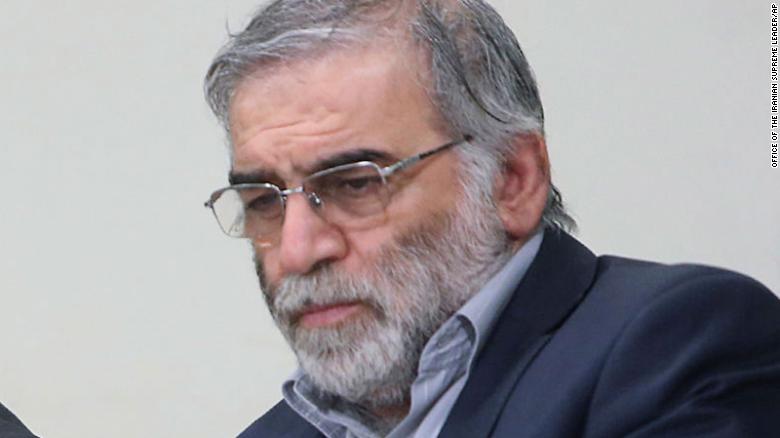
A top Iranian scientist believed to be responsible for developing the country’s military nuclear program was killed Friday, causing outrage in Iran and raising U.S. concerns over potential retaliation.
Mohsen Fakhrizadeh was in a vehicle that came under attack from “armed terrorists,” Iran’s Defense Ministry said in a statement. “In the shootout between Fakhrizadeh’s bodyguards and the terrorists, the scientist was seriously wounded and taken to hospital,” where the medical team was unable to save him and he succumbed to his injuries, it said.
State media said the vehicle was traveling outside the capital, Tehran, when it came under attack.
No one immediately claimed responsibility for the attack, but some senior Iranian officials said they believe Israel played a role.
“Terrorists murdered an eminent Iranian scientist today,” Iranian Foreign Minister Mohammad Javad Zarif said on Twitter. “This cowardice—with serious indications of Israeli role—shows desperate warmongering of perpetrators.”
The Israeli government declined to comment on Fakhrizadeh’s killing.
In April 2018, Israeli Prime Minister Benjamin Netanyahu mentioned the scientist when discussing Iran’s nuclear program.
“Remember that name, Fakhrizadeh,” he said, while announcing that the Israeli spy agency Mossad had stolen documents from Iran about its covert nuclear activities.
In remarks Friday following news of the killing, Iranian Defense Minister Gen. Amir Hatami said Fakhrizadeh had a track record of scientific and defense innovations, and led a team that developed one of the country’s first kits for coronavirus diagnosis. Fakhrizadeh, a professor of physics at Imam Hussein University in Tehran, was the former head of Iran’s Physics Research Center.
The U.S. State Department and Pentagon declined to comment on the incident.
But a senior U.S. official speaking on condition of anonymity said the killing has raised concerns of blowback from Iran against U.S. forces in the region, especially in Iraq, where U.S. forces already have faced attacks from Iranian-backed militias.
It’s not the first time Fakhrizadeh faced an attempt on his life. Israeli intelligence affairs journalist Yossi Melman reported that the Iranian scientist escaped an attempted assassination a few years ago.
In addition to Fakhrizadeh’s work as a physics professor, “he also led the clandestine Amad plan checking the feasibility of a nuclear bomb” and “led its weaponization efforts,” Melman wrote in a tweet retweeted by President Trump. “He was head of Iran’s secret military program and wanted for many years by Mossad.”
The U.S. Departments of State and Treasury started sanctioning Fakhrizadeh in 2008, blocking him from interacting with the U.S. financial system. The U.S. has publicly stated that Fakhrizadeh was the leader of Iran’s nuclear research program.
The killing could lead to reprisal by Iranian forces. When President Trump this month raised the possibility of attacking Iran to disable its nuclear program, U.S. military and other senior officials pushed back, warning of potential retaliation against U.S. troops in the region.
Still, Israeli Defense Forces allegedly were instructed in recent weeks to prepare for the possibility that the U.S. would strike Iran before Trump leaves office, Axios reported Wednesday. This belief wasn’t based on specific intelligence, but was due to the anticipation of a “very sensitive period” while Trump is still commander in chief, Axios said, citing senior Israeli officials.
Trita Parsi, founder of the National Iranian American Council, said in a series of tweets that Israel is a “prime suspect” in the attack because it has the expertise and motivation to do.
“Conducting attacks in Iran has few down-sides for Israel right now,” said Parsi, who has written extensively on the relationship between Iran, Israel and the U.S. “Either Iran lashes out and sparks a broader conflict that sucks in the US, bringing about a US-Iran confrontation that Netanyahu long has sought.”
The assassination is likely to complicate any Biden administration attempt to revive diplomacy with Iran, Parsi said.
Iranian officials have already promised the country would retaliate against the perpetrators, which they currently perceive to be Israel.
“In the last days of their gambling ally’s political life, the Zionists seek to intensify and increase pressure on Iran to wage a full-blown war,” said Hossein Dehghan, an adviser to Iran’s supreme leader, according to The Associated Press. “We will descend like lightning on the killers of this oppressed martyr and we will make them regret their actions!”
Previous cyberattacks by the U.S. and Israel, and assassinations of scientists haven’t stopped Iran’s nuclear program. This attack won’t either, said Ariane Tabatabai of the German Marshall Fund.
“A single man was not running the entirety of Iran’s nuclear program,” Tabatabai told All Things Considered. “This has become a much larger endeavor. And yes, he was an important player. But one of the more important parts of his role was to develop that infrastructure, to train others, to be able to continue the program. … I wouldn’t be surprised if you saw a bit more of the push within the system to go in the direction of a nuclear weapon.”
NPR

Leave a Reply
You must be logged in to post a comment.